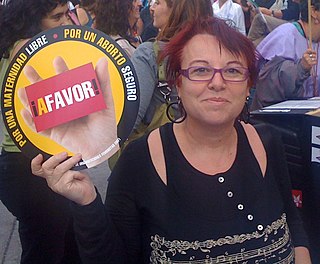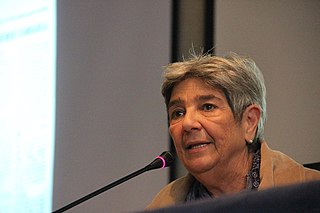
Graciela Sapriza (born September 12, 1945) is a Uruguayan historian and educator. Her research focuses on the social, political and cultural participation of Uruguayan women in the 19th and 20th centuries. [1] [2] [3]

Graciela Sapriza (born September 12, 1945) is a Uruguayan historian and educator. Her research focuses on the social, political and cultural participation of Uruguayan women in the 19th and 20th centuries. [1] [2] [3]
Graciela María Sapriza Torres was born in Montevideo, September 12, 1945. In 1974, she obtained a Bachelor's Degree in Historical Sciences with a minor in Research from the University of the Republic of Uruguay. At the same institution, she obtained her Master's Degree in Human Sciences with a minor in Latin American Studies in 2002. Her thesis was titled "The eugenic utopia: race, sex and gender in population policies in Uruguay (1920-1945)". [1]
During her career, she has served as a teacher at institutions such as the University of the Republic of Uruguay, the University of Valle in Cali, Colombia, the University of Málaga in Málaga, Spain, the University of Gothenburg in Gothenburg, Sweden and the University of Chile in Santiago, Chile, among others. Since the 1980s, she has published a large number of books, articles published in scientific journals, and newspaper texts. Her areas of research focus on the participation of women in social, cultural and political life in Uruguay and in the Río de la Plata region in the 19th and 20th centuries, with a particular emphasis on the memory of the civic-military dictatorship from a gender perspective. [1] [4]

Inés Suárez, was a Spanish conquistadora who participated in the Conquest of Chile with Pedro de Valdivia, successfully defending the newly conquered Santiago against an attack in 1541 by the indigenous Mapuche.

As established in the Colombian Constitution of 1991, women in Colombia have the right to bodily integrity and autonomy; to vote ; to hold public office; to work; to fair wages or equal pay; to own property; to receive an education; to serve in the military in certain duties, but are excluded from combat arms units; to enter into legal contracts; and to have marital, parental and religious rights. Women's rights in Colombia have been gradually developing since the early 20th Century.
Maria Matilde Bianchi Prada was a Uruguayan writer.
Armonía Liropeya Etchepare Locino was a Uruguayan feminist, pedagogue, novelist and short story writer. She was sometimes referred to as Armonía Etchepare de Henestrosa or, by her pseudonym, Armonía Somer. A member of the literary movement Generación del 45, Somers wrote in a transgressive style. Her contemporaries included Silvina Ocampo, Griselda Gambaro, Luisa Valenzuela, Elena Garro, and Peri Rossi.
Gladys Ethel Parentelli Manzino is a Uruguayan feminist theologian and photographer who has lived in Venezuela since 1969. A representative of Latin American ecofeminism, she was one of three Latin American women appointed by Pope Paul VI as observers at the Second Vatican Council.
Fany Puyesky Mitnik was a lawyer, writer, and dramatist known as "the first feminist" of Uruguay.

Cándida Martínez López is a Spanish historian, university professor, expert in women's history and studies, and politician. From 2000 to 2008 she was Councilor of Education of the Regional Government of Andalusia, and from 2008 to 2011 a deputy of the 9th Legislature of Spain. She is co-director of Arenal, Journal of Women's History.

Montserrat Boix Piqué is a Spanish journalist, considered among the most influential women in her country. In early 2000, she created and developed the concepts of social cyberfeminism, and a year later those of feminist hacktivism. Another of her main areas of work is gender violence and communication. She has also stood out as a defender of the right to communication and citizenship rights for women. Since 1986, she has been a journalist for the Information Services of Televisión Española (TVE), in the international section.

Rosa Cobo Bedía is a Spanish feminist, writer, and professor of sociology of gender at the University of A Coruña. She is also the director of the Center for Gender Studies and Feminists at the same university. Her main line of research is feminist theory and the sociology of gender.
María Teresa López Beltrán was a Spanish historian and medievalist, a professor at the University of Málaga.

Lilián Celiberti is a Uruguayan feminist activist. She became a political prisoner under the military dictatorship and lived in exile in Italy. She is a founding member and coordinator of the feminist collective Cotidiano Mujer, and she is also a leader in Articulación Feminista Marcosur, which promotes the development of a feminist political platform at the regional and global level.
Sara Rey Álvarez (1894–1949) was a Uruguayan writer, feminist and political activist.

Silvia Rodríguez Villamil was an Uruguayan historian, feminist, writer, as well as a political and social activist.
Marcelina Almeida, was an Argentine-born Uruguayan writer living in Montevideo, since she was young. Almeida used the pseudonyms Abel and Reine mi bella acclamada to sign her contributions in publications of the time. Her work, Por una fortuna una cruz, is considered the first Uruguayan feminist novel.

Mirta Zaida Lobato is an Argentine historian, essayist, and full professor specializing in the social, cultural and political history of the world of work and gender relations in Argentina and Latin America in the 20th century. Lobato was the founder of "Área Interdisciplinaria de Estudios de la Mujer" (AIEM). She was awarded a Guggenheim Fellowship in 2006.

Suzana Prates was a Brazilian feminist sociologist and academic. She spent most of her professional career in Uruguay where she dedicated her life to national and Latin American feminist thought. She was the founder of the "Centro de Estudios e Informaciones del Uruguay" (CIESU) and, at the end of the 1970s, she founded the "Grupo de Estudios sobre la Condición de la Mujer en Uruguay" (GRECMU). Her colleagues included Julieta Kirkwood and Elizabeth Jelin.
Doris Perla Morales Martínez is a Uruguayan lawyer who serves as a minister of the Supreme Court of Uruguay.

Teresita de Barbieri García, was an Uruguayan feminist sociologist, academic, and researcher based in Mexico. A researcher in social sciences and gender studies, she was a pioneer in research on the condition of women in Latin America from the Institute of Social Research of the National Autonomous University of Mexico (UNAM). A socialist militant, she survived the 1973 Chilean coup d'état and went into exile in Mexico where she developed her research career. A sociologist at the Latin American Faculty of Social Sciences (FLACSO), she researched the daily life of women, the Latin American feminist movement, reproductive health, secularism and, in particular, population and development. She wrote articles for various newspapers and magazines, including Fem magazine and the "La Doble Jornada supplement" of La Jornada newspaper, as well as for Cimacnoticias (CIMAC).
Virginia Guzmán Barcos is a Chilean psychologist and sociologist, who was a co-founder of the Flora Tristán Peruvian Women's Center. After completing studies at the Pontifical Catholic University of Chile and École pratique des hautes études at the Sorbonne, she went into exile in Peru because of the military dictatorship in Chile. Continuing her studies, she earned a master's degree in Peru and a PhD in Spain. From 1978, she became interested in women's studies and began researching in the area of women and public policy. After twenty years working at the Flora Tristán Peruvian Women's Center, she returned to Chile. Since 2002, she has been the deputy director of the Centro de Estudios de la Mujer in Santiago.
Graziella Corvalán was a Paraguayan sociologist and linguist most known for her efforts to preserve the Guarani language and for creation of one of the first women's studies programs in Paraguay. Her works stressed the need for public policies to eliminate discrimination on the basis of gender and language. She was recognized by the government of Paraguay in 2010 with the Grand Cross of the National Order of Merit. The following year, she was the recipient of the Serafina Dávalos Prize from the Municipal Board of Asunción and in 2022 was recognized by the United Nations Paraguay office.